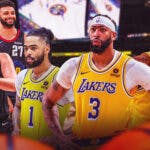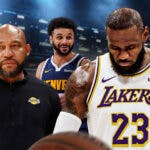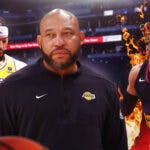Earlier this week, The Athletic's Jovan Buha reported that the increased momentum toward the Los Angeles Lakers running it back with Russell Westbrook is not solely posturing. Here's what my fellow beat reporter wrote:
“It’s not merely a bluff or tactic to try to regain leverage in trade talks. That may be an ancillary motive, sure, but per league sources, there is a sentiment among some within the franchise that the right coach and a better supporting cast could smooth over Westbrook’s awkward fit with James and Davis.”
Despite the fact that Westbrook punctuated his disastrous 2021-22 campaign with a bridge-burning press conference in which he pointed the finger at everybody else (including LeBron James and Anthony Davis) — preceded by Rob Pelinka omitting Westbrook from the team's future plans — the Lakers unenviable predicament has apparently caused them to reconsider the situation.
As their inert trade deadline initially signaled, the Lakers don't want to spend draft capital to get rid of Russ. Folks in the front office think Frank Vogel mishandled Russ from the jump. Two of Jeanie Buss' closest advisors, Phil Jackson and Magic Johnson, believe there are pathways for the Lakers and Westbrook to make it work. The Lakers are quizzing head coaching candidates on how to maximize Russ.
Finding success with Westbrook is also good for the brand; the Lakers want to be known as the place where stars thrive — not fail spectacularly.
Technically, the Lakers have five options with Westbrook, assuming he picks up his $47 million player option before June 30. They can trade him, buy him out, waive-and-stretch him, send him home (a.k.a. “John Wall” him), or begin the 2022-23 season with him on the squad. None of those are ideal, and it's hard to see any route that thrusts the Lakers into contention in what should be a loaded and improving Western Conference.
But that's where they're at. Let's rank those five possibilities, from “worst” to “best”.
https://open.spotify.com/episode/7LkPmnLI6ocyR5HfvBHxid?si=379a304102734b04
5) Bring him back
I've been emphatic in my stance: Bringing Westbrook back would spell doom. For one thing, the fans turned on him and vice versa, to the point where he openly dreaded home games. His negative vibes cast a pall over the team and permeated the locker room. His postgame demeanor and shade-throwing didn't help.
Even if there are ways to theoretically improve the basketball fit, it's hard to envision anything actually working. When they staggered minutes last season, Westbrook failed to winningly run the show. His net rating was abysmal. The team struggled regardless if one, two, or zero stars were alongside him.
The Lakers don't have the means to reconstruct an ideal roster around him rife with two-way role-players and sharpshooters. Even if their next coach staggers rotations as much as possible, Westbrook will not want to come off the bench nor sit in crunchtime.
And therein lies the biggest problem: Russ' unwillingness to adapt. Last summer, Westbrook sold LeBron and Davis on sacrifice, only for him to renege on that pledge literally on the first day. Not only has he never made a sustained effort to evolve — his shooting and defense have worsened — he hasn't acknowledged that he needs to entertain the concept of doing so. He clearly believes he should be treated as a superstar in his prime — not a declining veteran who must conform.
So, sure, it's easy for Magic Johnson to say: Just hire a new coach, go to dinner, talk it out, and it'll be all good. On paper, a savvier offensive tactician (Terry Stotts?) or more commanding presence (Darvin Ham?) may be able to goad more positive results and effort from Westbrook. But, that a) won't fix the defensive and spacing issues he causes and b) won't magically transform Westbrook into an elite third-banana ready to embrace the intangibles, move without the ball, set screens, and nail weakside rotations.
People don't just change overnight — especially former MVPs earning nearly $50 million with a 14-year track record of stubbornness.
4) Waive and stretch
The Lakers can cut Westbrook and stretch his remaining money over the next three years. Throwing away $15 million in annual cap space through 2024-25 would sting, but there are upsides. Simply shedding Russ is addition by subtraction and makes them better next season. In this case, they would do so without losing a draft pick or Talen Horton-Tucker.
The stretch would get them under the luxury tax, enabling them to deploy the nontaxpayer mid-level and bi-annual exceptions. The former could be used to keep Malik Monk or chase a 3-and-D. The latter could pull a decent role player (they used it on Wesley Matthews in 2020-21).
The Lakers are reportedly not interested in this route, which is understandable considering Luol Deng just came off the books. But they should consider it if no trade arises.
3) John Wall him
The Lakers could send Russ home and eat the money.
This would be uncomfortable, but it isn't a terrible option. Again: addition-by-subtraction, they'd keep picks/THT, and freeing $47 million would provide massive relief post-2022-23. Pelinka could still work the phones until the trade deadline.
There's approximately zero percent chance this happens before the season. But, should the basketball begin and last season's issues resurface, then who knows.
2) Trade him
Broadly speaking, there are two trade archetypes for the Lakers to explore. One is a salary dump, in which the Lakers deal Russ to one of the few rebuilding teams with cap space (i.e. OKC/Orlando). Another would recoup role players. (Zach LaVine ain't happening.)
If the Lakers are truly unwilling to attach a first-rounder, the former option is out of the question. As for the latter, the best return package they could hope for is mediocre dudes on bad contracts. Still, a few back-end rotation pieces would be more useful than one high-usage Westbrook.
A trade is the one avenue on this list that would cost the Lakers future assets, but take a glance at the prospective 2023 or 2024 free-agent classes. There aren't going to be available stars for the Lakers to sign into cap space, should they have it. The cap figure will rise, too. Having a few less-than-ideal contracts won't cripple the franchise.
Ultimately, the priority for the next two seasons is maximizing the talent around LeBron. If that means trading a first-round pick eight years away, so be it — especially if they can land a package as good as Malcolm Brogdon and Buddy Hield.
1) Buy him out
Unfortunately, the best option is the least likely. There's no evidence to indicate that Russ would accept a buyout (why would he?), and the Lakers penny-pinching of recent years renders it wholly unfathomable to envision Jeanie writing a large enough check to change his mind.
But, that check would not count against the cap, the Lakers organization would fiscally survive, and both parties could go their separate ways. Alas.




